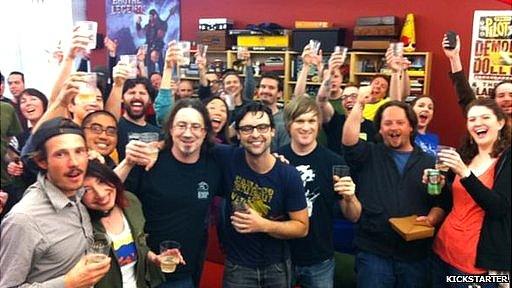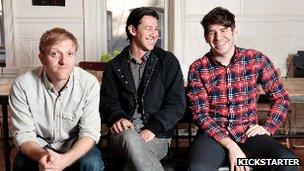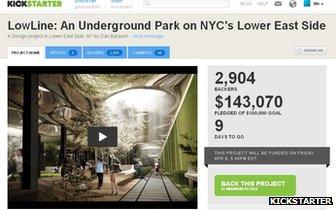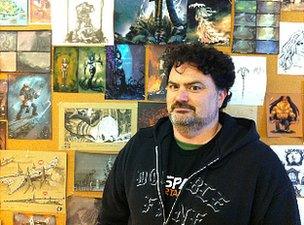Kickstarter crowdsourced cash empowers US innovators
- Published

Double Fine's developers were surprised to raise $1m within 24 hours
The calm, industrious mood inside Double Fine Production's office masks the elation that erupted into champagne-splashed toasts earlier this month.
The San Francisco-based video games developer is making history by bankrolling its next title using only crowdsourced cash.
Within24 hours of seeking pledges, externalover the internet it had bagged more than $1m (£630,000), overshooting its initial target of $400,000. By the campaign's end it had reeled in a total of $3.4m from more than 87,000 supporters for its point-and-click adventure game.
The studio's founder, Tim Schafer, is legendary in gaming circles for titles including Psychonauts and Brutal Legend, but he had still found it hard work to secure funds through traditional means. So the idea of going direct to his fans had obvious appeal.
"It felt great because it was like getting validation for a project at the beginning instead of the end," he told the BBC.
In return for their monetary support, backers will get to chat with game makers in a private online forum, share feedback on the game's progress, and occasionally vote on next steps if developers get stuck. Fans will also be involved in beta testing and will get a free copy of the finished game.
Backers who pledged $30 or more are also promised access to documentary videos charting its progress.
"Either the game will be great or it will be a spectacular failure caught on camera for everyone to see," Mr Schafer said.
Peer-to-peer
Double Fine's headline-grabbing effort also marked a major milestone for Kickstarter - the crowdsourced fundraising website that facilitated the online endeavour.

Kickstarter's founders (left to right): Charles Adler, Perry Chen and Yancey Strickler
Since launching three years ago, the Brooklyn-based start-up has become an internet phenomenon, emerging as the world's largest funding platform for creative projects.
Think of it as a peer-to-peer funding - bypassing government subsidies and corporate gifts, to put creators directly in touch with fans who are also willing to become financial backers.
To date, $175m has been raised to help thousands of indie artists, filmmakers, musicians, gamers, designers, photographers, dancers and the like get their dream projects off the ground.
This year three projects have eclipsed the $1m pledge mark - underlining Kickstarter's own rapid rise.
"Ideas are being funded not because they might be a good investment or produce a good return, they're being supported because people want them to exist," Yancey Strickler, Kickstarter's co-founder, told the BBC.
"[Before Kickstarter] the starting point for judging any idea really came from: 'Will this be profitable?'"
Film festivals
Mr Strickler and his team set out to challenge the commercial decisions that drive most investments to put more emphasis on art and creativity.
"That way the door gets blown wide open and a lot more things have a chance to come to fruition," Mr Strickler added.
Underscoring this point, films - a notoriously risky investment - have emerged as Kickstarter's most popular category. While some may be destined for obscurity, many are finding success.
About 10% movies screened at the Sundance and SXSW festivals were funded through the site.
Blue Like Jazz - a film that raised $346,000 in pledges - has also been scheduled for a theatrical release in April - 799 people are named "associated producer" in its credits.
"People are often uncomfortable talking about funding in public," Mr Strickler said.
"They're just not sure how will this make them look. Does this mean I'm desperate? But time counters those sorts of anxieties and apprehensions.
"As more people use this, it validates it for other people."
'Utopian idea'
Rarefied ideas also tend to flourish.
Recent campaigns include a "superhero-grade bottle opener"; a wrist watch made from an iPod Nano; an all female comic anthology; and Lowline - a plan to transform an abandoned trolley terminal into New York's first underground park.

The Lowline park project smashed through its $100,000 target with time to spare
While some liken Kickstarter to a meritocracy, the company's founding trio consider it an example of patronage in action.
The internet's ability to rally people around shared interests and make "big things happen" is a breakthrough, they say.
"It's a pretty high-minded idea," Mr Strickler concedes. "One you could argue is a little utopian and naive, but it has worked."
Anyone with an idea can set up a Kickstarter. Pitches usually involve a short video describing the project, funding targets and a countdown - typically starting at one month - showing how much time is left to pledge cash.
The creators retain 100% ownership and can freely distribute and market their works.
Rewards
But Kickstarter is not a one-way cash funnel. Nor is it meant to replace philanthropy either.
Unlike Rockethub, Fundly, Indiegogo, Kiva and Causes, which are primarily online hubs for donations or loans, Kickstarter is all about seeding projects through collaborative funding (crowdfunding), as well as collective creativity (crowdsourcing).
"It's not just clapping on the sidelines," clarifies Mr Strickler. "Backers benefit from a project just as much as the creator."
Every Kickstarter project is required to offer a reward of some kind, and supporters get an opportunity to get involved in the schemes.
This type of fan engagement and "remix culture" is becoming a fast-moving trend. It is also attracting the attention of established players.
The chief marketing officer of Rovio, the maker of the hit video game Angry Birds, recently expressed an interest.
"Being a fan now is a lot more than waiting to check out the movie with your favourite actors - you actually want to be part of it," Peter Vesterbacka told the BBC.
"We're going to see fans getting involved in the funding, creation, marketing, everything."
So do not be surprised if future versions of Angry Birds are crowdsourced too.
The trend can also be seen at Soundcloud - the Berlin-based "social sound platform". The service is used by the rapper Snoop Dogg to share music with his fans. He regularly solicits his audience for producers or extra verses on his latest beats.

Mr Schafer promises the new game will be "something brand new" and not a sequel or port
Wreckamovie.com does much the same with film.
Backlash?
So, what's the downside?
Well, some fans do not want to know the ending of a film, game or song in advance. They prefer to be surprised by new releases from their favourite artists.
Double Fine is already experiencing a mini-backlash with work on its Kickstarter-funded project hardly begun.
One sceptic shared his take online: "If it's good I'll buy it day one, no questions asked, but with all this fan 'input', I just find it hard to believe the game will be anything other than mediocre."
Mr Schafer says he understands this, does not expect his entire support-base to participate in all aspects of the game's development, and agrees things should be kept in perspective.
"It's called Kickstarter, right? It's not supposed to be where you get your money forever," he said.
"It's supposed to start you off. The hope is that we would actually make our own money and self-publish another game in the future."
- Published28 March 2012
- Published8 March 2012
- Published19 November 2011